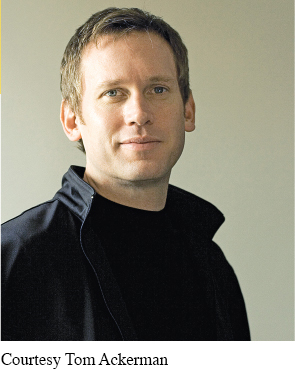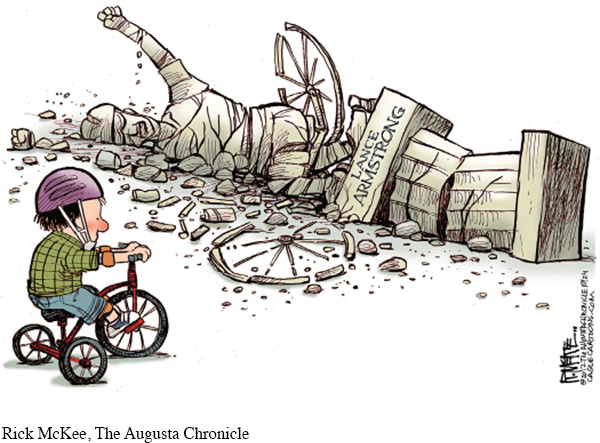7.17
Cheaters Never Win
Christopher Bergland

Christopher Bergland (b. 1966) is a retired ultra-
KEY CONTEXT Bergland wrote this piece for Psychology Today in 2012, when Lance Armstrong, the winner of seven consecutive Tour de France cycling races, announced that he would no longer fight the charges of using illegal drugs and in the months after would finally acknowledge that he had, in fact, used performance-
Lance Armstrong was a hero to me and millions of people from all walks of life. This week, Armstrong announced he would no longer contest doping charges brought against him by the United States Anti-
Do you think that Lance Armstrong cheated? If so, was it justifiable if in the world of cycling — where all of your top competition seems to be using performance enhancing drugs — that if you want to “beat them,” you have to join them in not playing by the rules? Although Lance has given up his fight against the charges, he maintains his innocence and says that he was subjected to an “unconstitutional witch hunt.” But this may only be the beginning of his saga and legal woes. The International Cycling Union is demanding that the USADA hand over evidence and many civil suits are expected to follow.
Shame is a toxic emotion. It seems impossible that Lance Armstrong won’t be consumed with shame on a conscious or subconscious level for the rest of his life. Shame eats you up inside and prevents you from being able to truly connect with other people. The shame associated with cheating is the price cheaters pay, and why cheaters never win — even if they’re never caught. The next time you think about cheating, ask yourself — would you rather have won seven Tour de France titles and had all the glory in your prime, if you then had to pay the price that Lance will pay for the rest of his life?
This morning I went in search of some Lance Armstrong quotations about “sports and competition” that might show a part of his psyche when it came to a “win-
5 Athletic competition — especially in games like pick-


This editorial cartoon by Rick McKee of the Augusta Chronicle visually depicts the idiom of “a fallen idol.”
We live in such a competitive world. From a very young age our children are taught that if they want to “succeed” in life that they have to finish in the top percentile in just about every challenge they face. The world does not automatically reward people who are viewed as being “mediocre” in a meritocracy. But not everyone can be a champion. There is always a bell-
I believe that it is the time we spend with family, friends and feeling healthy, alive and connected that is our biggest source of joy. Again, it is easy when you have “made it” to proselytize about the virtues of not caring if you “win or lose.” The reality can be much different, especially if you’re struggling economically. Because winning does matter. This is a paradox we all have to navigate in sport and in life. Yes, you want to be your absolute best and to try your hardest to win and to be thrilled if you are victorious. . . . But you cannot cheat to win on an ethical and karmic level. I believe that the bad karma and ill-
But what do you do if all of the people you’re competing against are taking performance enhancing drugs, especially if they’re legal? Adderall and other “brain enhancing” prescription drugs that people take to get better grades or seem like a rock star at work create an uneven playing field. But again, if all of your peers are doing it and you want to remain competitive what are you supposed to do? I am a zealot about the power of physical activity to take the place of many prescription drugs. Physical activity will boost brain power, creativity, focus, reduce stress and give you grace under pressure when you face a big challenge. All without any negative side effects of a pill.
Regular physical activity at a tonic level is a magical elixir with very little pecuniary costs or detrimental side effects. One thing that I find so depressing about the drug abuse in cycling is that for the short-
10 Ultimately, sportsmanlike behavior and The Athlete’s Way is about building mindset, character, resilience and close-
Understanding and Interpreting
What are the reasons that Bergland gives for his statement “[C]heaters never win”?
At times, Bergland uses sports as a metaphor for how to live life in general. Explain what he is suggesting about the connection between sports and life outside sports.
An effective argument should always address the opposition’s main arguments. Where and how does Bergland address those who might think differently? How successful is he at refuting the counterarguments?
Summarize what Bergland is suggesting about the differences between short-
term and long- term goals. According to what he wrote in this piece, how would Bergland define the term “success”?
Analyzing Language, Style, and Structure
What is Bergland’s tone toward Lance Armstrong? What word choice and topics help to create this tone?
In the fourth paragraph, Bergland intentionally juxtaposes a quote from Lance Armstrong with a description of the ideals of athletic competition he writes about in his book The Athlete’s Way. How does this juxtaposition reflect the theme of this piece?
Look back through this piece and consider Bergland’s use of questions. Choose two questions that you find interesting rhetorically and examine their intended effect.
How does Bergland establish his ethos in this piece? How does this help or hinder his argument?
Connecting, Arguing, and Extending
Bergland makes several claims about sports, life, and human nature. Explain why you agree with, disagree with, or would qualify each:
“People who play by the rules ultimately prevail” (par. 5).
“The priority of sports [. . .] should be about fostering character” (par. 4).
“[Y]ou cannot cheat to win on an ethical and karmic level” (par. 7).
“So, be a good sport and play fair! It will [. . .] make you a happier person” (par. 10).
- Page 502
Bergland says that at some point we all come to recognize that in both sports and life “winning does matter.” Write about a time when you or someone you know had to learn this lesson. What was gained and lost when you or your subject learned this lesson about winning?
Take a look at the following chart from an article titled “Anabolic Steroids and Pre-
Adolescent Athletes: Prevalence, Knowledge, and Attitudes,” which was published in 2008 in the Sports Journal. What conclusions can you draw about the information that adolescents receive about steroids and what Bergland might suggest to change adolescents’ perceptions of steroid use? TABLE 5. Primary Source of Information about Anabolic Steroids
No. of Youth Sports Participants (n = 1,553) Source –n % Book/Magazine 433 28 Parent 322 21 Coach 267 17 Friend/Teammate 113 7 Gym Personnel 112 7 Athletic Trainer 89 6 Teacher 47 3 Television 29 2 Dealer 17 1 Sibling 15 1 Table 7.1